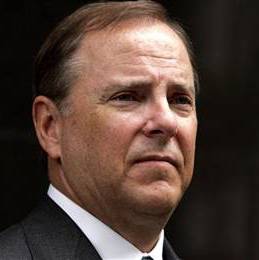 Oral argument on Jeff Skilling’s appeal of his criminal conviction to the United States Supreme Court is next Monday afternoon, so the Skilling legal team warmed up for the occasion by filing the brief below in response to the Department of Justice’s brief on the merits.
Oral argument on Jeff Skilling’s appeal of his criminal conviction to the United States Supreme Court is next Monday afternoon, so the Skilling legal team warmed up for the occasion by filing the brief below in response to the Department of Justice’s brief on the merits.
If you want to read the entire brief, then I recommend downloading it so that you will be have the version bookmarked in Adobe Acrobat that facilitates review.
The DOJ’s case against Skilling has shrunk considerably, which is highlighted by the following Skilling reply brief passage on the DOJ’s tepid defense of Skilling’s conviction for honest services wire fraud under 18 U.S.C. 1346:
The Government’s application of its proposed self-dealing category to Skilling’s case demonstrates the continued manipulability of the statute under the Government’s approach. In Black and Weyhrauch, the Government expressed the view that 1346 prohibits only bribes/kickbacks and self dealing, and that the latter category is implicated only when conflicting financial interests are “undisclosed.” [references omitted].
That statement suggested that the Government would concede that Skilling did not commit honest-services fraud, because Skilling’s only alleged personal financial interests arose from Enron’s linking of his compensation to Enron’s stock value, an interest that was fully disclosed.
But the Government nevertheless argues that Skilling committed honest-services fraud. To bring Skilling’s case within the statute’s compass, the Government creates a third category of honest services fraud, one that involves disclosed personal financial interests.
The Government’s cursory explanation of Skilling’s honest-services liability (GB50) is hardly clear, but it appears to contend that while Skilling’s “personal financial interests” were disclosed and generally aligned with Enron’s interests, he put those interests in conflict when he took actions pursuant to his own disclosed compensation interest that were allegedly contrary to Enron’s. Accordingly, in this new category, what the defendant apparently fails to disclose is his scheme to put his own compensation interests ahead of his employer’s distinct interests.
Not only is that standard itself vague on its own terms, but the Government’s repeated acknowledgement that Skilling’s case has no precedent in pre-McNally case law (GB17, 49) confirms that this special crime is its own new category, created for the first time in the Government’s brief in this Court.
It is time for prosecutors to stop making up crimes under this statute. If 1346 is not invalidated altogether, it should be limited to the single category of conduct universally recognized in the case law and hence largely immune from manipulation quid pro quo bribes and kickbacks.
Stated simply, the Enron Task Force prosecuted Skilling for business judgments that he made that turned out badly for Enron viewed through the clarity of hindsight bias. But Skilling didn’t steal a dime from Enron and never took a kickback or a bribe. Those latter acts are crimes. Taking business risks that turn out badly is not.
At a time in which the U.S. economy desperately needs risk-takers to generate jobs and create wealth, here’s hoping that the Supreme Court understands the difference.
Jeff Skilling’s Reply Brief to the DOJ’s Brief in his Supreme Court Appeal
